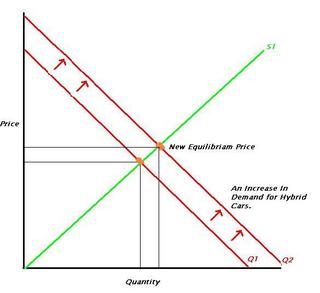-24 Hours October 5th, 2005-
With oil prices soaring through the roofs nowadays, people are turning their attention to new and environmentally-friendly alternatives for their means of transportation. According to the 24 Hours, more people are willing to spend money on expensive hybrid cars rather than to spend money on gasoline for their SUVs. The reason? Since the declaration on the War on Iraq, along with the recent devastation of hurricanes, and the increasing demands of oil by China, it seems that the oil prices can only go higher in the future. Ironically, it was the war on Iraq (which advocated more extraction of oil) that started this trend of environmental and fuel-efficient cars.
Relation to Chapter 2 – Supply and Demand, Elasticity
With new Hybrid technology available, more car owners are abandoning their “monster trucks” (referring to big and inefficient vehicles, like SUVs). Popular cars like the Volkswagen Beetle and Honda Civic Hybrid are becoming more commonplace on the streets. This new trend, also known as a change in supply and demand, is vital to ensure the survival of our natural resources from belligerent world leaders in the near future. According to the 24 Hours, manufacturers (namely Toyota) are supplying more hybrid cars onto the market. Not only so, the demand for these cars is increasing as well; however, because cars are considered to be and “elastic” product (economically speaking), the demand for different cars fluctuate according to its number of close substitutes (in this case, very elastic). Will hybrid cars become our transportation-of-choice in the future? It all depends on the consumers; “Consumers Are The Kings”.

